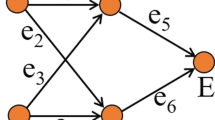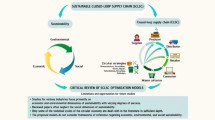Abstract
The criteria of system complexity are physically interpreted for the problem of optimal process organization in chemical engineering. To that end, optimization by means of a thermoeconomic approach using undetermined Lagrange multipliers is considered. The Lagrange multipliers obtained characterize the complexity of the system and represent the unit exergy cost of intermediate streams or product streams, which by definition must be minimized. The Lagrange multipliers obtained by applying the information approach to optimal system organization also characterize its complexity. By analogy, it may be supposed that they reflect the unit information cost of intermediate streams or the product streams similar to thermoeconomic criteria. It was shown that thermoeconomic complexity criteria cannot be used in practice on account of various fundamental limitations. Conversely, information complexity criteria are of practical value since all the characteristics present depend solely on process operating parameters. Decreasing the unit information cost is viewed as a tradeoff between the possibility of additional energy reserves in the system, on the one hand, and the costs of organizing energy production processes, on the other. Accordingly, these criteria may be regarded as hybrid, analogously to thermoeconomic criteria.


Similar content being viewed by others
REFERENCES
Reimers, N.F., Prirodopol’zovanie. Slovar’-spravochnik (Nature Management: Glossary and Handbook), Moscow: Mysl’, 1990.
Kafarov, V.V., Perov, V.L., Bobrov, D.A., et al., Analysis of chemical technological processes using the principles of information theory, Dokl. Akad. Nauk SSSR, 1977, vol. 232, no. 3, pp. 663–666.
Kafarov, V.V., Perov, V.L., Bobrov, D.A., and Naletov, A.Yu., Information criteria of chemical engineering system performance, Dokl. Akad. Nauk SSSR, 1977, vol. 236, no. 2, pp. 404–407.
Naletov, V.A., Glebov, M.B., and Naletov, A.Yu., Evolutionary synthesis of chemical engineering systems on the basis of an information approach, Khim. Tekhnol. (Moscow), 2010, no. 4, pp. 244–252.
El-Sayed, Y.M. and Evans, R.B., Thermoeconomics and the design of heat systems, Trans. ASME, 1969, vol. 92, pp. 27–34.
El-Sayed, Y.M. and Tribus, M., The strategic use of thermoeconomic analysis for process improvement, Proc. the AIChE National Meeting, Detroit, MI, New York: Am. Inst. Chem. Eng., 1981, pp. 41–47.
Kafarov, V.V., Cybernetic Methods in Chemistry and Chemical Engineering, Moscow: Mir, 1976.
Boyarinov, A.I. and Kafarov, V.V., Metody optimizatsii v khimii i khimicheskoi tekhnologii (Optimization Methods in Chemical Technology), Moscow: Khimiya, 1975.
Naletov, V.A., Glebov, M.B., and Naletov, A.Yu., Optimal organization of chemical engineering systems of specified structure: a hierarchical approach, Coke Chem., 2015, vol. 58, no. 7, pp. 262–267.
Beskov, V.S., Vanchurin, V.I., and Davidkhanova, M.G., Kursovye raboty v khimicheskoi tekhnologii: metodicheskoe posobie (Graduate Works on Chemical Technology: Manual), Moscow: Ross. Khim.-Tekhnol. Univ. im. D.I. Mendeleeva, 2003.
Author information
Authors and Affiliations
Corresponding author
Additional information
Translated by Bernard Gilbert
About this article
Cite this article
Naletov, V.A. On the Physical Interpretation of Complexity Criteria for Optimal System Organization in the Chemical Industry. Coke Chem. 62, 107–112 (2019). https://doi.org/10.3103/S1068364X19030050
Received:
Revised:
Accepted:
Published:
Issue Date:
DOI: https://doi.org/10.3103/S1068364X19030050




